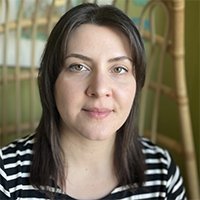Tom Howard/Margaret Reid Poetry Contest 2022
Congratulations to the winners of the 20th annual Tom Howard/Margaret Reid Poetry Contest!

First Prize $3,000 Traditional Verse
Tamara Panici, Elegy for Childhood Written in a Language I Did Not Yet Speak, Addressed to the God I Once Knew
Honorable Mention $200
- jason b. crawford, Unicorn Kidz Dance Under the Moonlight, Too, Poetry
- Jane Ebihara, Last Kiss, Poetry
- James Evans, Places I Could Not Reach, Poetry
- Jed Myers, Blues for the Fathers, Poetry
- LS, Children from the Coast, Poetry
- Alfredo Aguilar, California, Traditional Verse
- Richard Haney-Jardine, thirteen ways of looking at the faggot, Traditional Verse
- A.D. Lauren-Abunassar, Abandoned Sestina, Traditional Verse
- Dion O’Reilly, After the Final Skin Graft, Traditional Verse
- Gail Thomas, Cento for Women Who Are Not Believed, Traditional Verse
Judge Soma Mei Sheng Frazier comments on the winning entries
"THE SEXIEST MAN ALIVE"
I first read this emphatic headline as a high school freshman, in line behind my mother at the grocery store. The magazine was popular, as was the man, who wore a sly grin. Nah, I thought, examining the face on the cover.
Literary merit is as personal as attraction, as deeply felt and frustratingly subjective. Toni Morrison, a writer known for marrying surgical precision with creative wizardry, experimented masterfully with subjectivity. Her sole published short story cleverly lays bare how much individuals bring to the experience of reading literature—inferring, reframing, manufacturing. Morrison's story is hailed as a masterpiece. Yet somewhere out there, someone is setting down "Recitatif" right now, thinking Nah.
If literary merit is not objectively judicable, why enter a poetry competition? Perhaps for the same reason many of us write poems: to enter into intimate, intentional dialogue with people who, upon ingesting our work as one might devour a home-cooked meal, can no longer call themselves strangers. For what is more reassuring than shouting into the ether and hearing a voice shout back? This year, 2,495 writers lifted their voices to us. My fellow judge, Michal Jones, and I spent days, nights, weeks, months weighing their words—each poem drenching us in radiance, nostalgia, music, destruction, divinity...each poem gripping us. Spinning us. Vibing with us. Poets near and far, we hear you. And we thank you.
But now, we are tasked with presenting "THE WINNINGEST POEMS ALIVE".
So, without further ado, here the twelve works that moved us to shout back into the ether. Certainly, these poems evince mastery: the strategic use of poetic devices such as tone, repetition, structure, euphony, enjambment and more. Beyond that, though, there's magic in them. We hope they will move you too.
The Winners
"Orion" by Maurya Kerr
Tom Howard Prize for verse in any style
"My boy came into the room and said, Mom, you are / the hound, Dad is the hunter, and I am the—" Like a boy wiping sleep from his eyes, this poem enters our environs naturally, unapologetically, seeking something. But we are the ones who find what we need in "Orion", the winning poem. We are the ones who stumble after meaning, after message, to find it standing naked in the night—stronger, brighter, surer than expected. Wiser and humbler too.
"Elegy for Childhood Written in a Language I Did Not Yet Speak, Addressed to the God I Once Knew" by Tamara Panici
Margaret Reid Prize for verse that rhymes or has a traditional style
The traditional English elegy is a true diametric balance—part mournful lament, part consolation. "Elegy for Childhood Written in a Language I Did Not Yet Speak, Addressed to the God I Once Knew" dexterously maintains perfect tension. The poem sings out in happiness and sorrow. Its methodically jumbled form, at once certain and sracmbled, reflects our thrashing attempts to put things in order; to understand what and why and how we are, and in whose image, if anyone's, our world was made.
Honorable Mentions: Tom Howard Prize
"Unicorn Kidz Dance Under the Moonlight, Too" by jason b. crawford
Probing at duality and identity, expression and risk, this superbly-crafted poem pulls us into a smooth/halting dance. Or, put another way, I stifled an audible cry reading this poem. That's how hard it tugged at me. Perhaps this is because it gave voice to men and boys I know; men and boys you'll recognize, too, who dare not dance, dare not drive, dare not jog, kiss or venture outside; men stifling the boys they once were, or almost were; men resigned to waiting for death to grant them a little freedom. A little softness. Protection. Safety in their scarred, swallowed-up glittering skins.
"Last Kiss" by Jane Ebihara
If the bildungsromans are to be believed, it's hard to forget one's first kiss. Yet few novels, few movies, few plays examine the fact that one's last may slip by unnoticed. And just when you think you've pinned this poem down, it, too, will slip past you. Like the graze of a loved one's lips, like the swollen sea meeting the land, "Last Kiss" will spill over and into you, then fall back, leaving you breathless.
"Places I Could Not Reach" by James Evans
As editor of a magazine, I've witnessed accomplished authors struggling to cut their bios down to 75 or 100 words. Proper distillation is as tricky in writing as in chemistry. Yet "Places I Could Not Reach" outshone thousands of longer poems, including sonnet coronas and sestinas, prose poems and in-depth odes. This short, affecting piece ranges from general to localized, tender to abject, physical to figurative in just 35 words: less than half of what I've used to describe it.
"Blues for the Fathers" by Jed Myers
Fathers trying on metal wings in the driveway, disappearing into the sun. Fathers careful to miss everyone's eyes, pushing back chairs, leaving their hearts still chugging in the fuselage. True to the genre "Blues for the Fathers" claims, this poem is lyrical rather than narrative, combining poetic elements as disparate as spirituals, ballads, chants and field hollers to evoke atmosphere, empathy and awe.
"Children from the Coast" by LS
"The thing about a hurricane is that it is like any other animal from the ocean. / It is not meant to survive on land." This poem will whack the teeth from your mouth so you must learn to speak with your hands—and while it is not easy to win a competition with a very short poem, neither is it common for a 74-line poem to hit so hard, starting strong and staying strong and ending strong as a punishing gale that stings your eyes.
Honorable Mentions: Margaret Reid Prize
"California" by Alfredo Aguilar
Jericho Brown named his poetic form (a structural sonnet-ghazal hybrid) a duplex because its couplets, each mirroring the next, recalled to him a house with two sides and two addresses. But the duplex is also thematic: it investigates the human condition of living together and apart. "California", then, spans multiple dualities: moving away/returning home, standing above ground/lying six feet under, working on work/working on words. This poem sends us running straight into its own blaze, protected from the fire only by a thin partition.
"thirteen ways of looking at the faggot" by Richard Haney-Jardine
The list poem, a form employed by the Greeks and Ginsberg alike, has become such a staple that it is taught in kindergarten classrooms. It does not require rhythm or meter. It does not demand a complex rhyme scheme. But there is a challenge in the form's simplicity: a perspicuous list linking each item neatly may be predictable—while one comprised of mismatched items fails. A straightforward list may be too literal, while an elaborate one may be tedious or overwrought. "thirteen ways of looking at the faggot" nimbly avoids every trap. This striking work rises from the page "beautiful / guilty as an orchid."
"Abandoned Sestina" by A.D. Lauren-Abunassar
"Abandoned Sestina" is no misnomer. There are more than 39 lines here, all in tercets that ditch the traditional form's strict end-word pattern. Yet the poem—with its repetition and polyptoton, its motifs, internal rhyme and near rhyme—is as mesmerizing as any sestina. Its words and sounds tumble in tweaked configurations that invert and reposition ideas, spinning meaning round and round, over and over, till it comes out clean.
"After the Final Skin Graft" by Dion O'Reilly
There is no phoenix in "After the Final Skin Graft", only a dimpled, plucked goose. But there is a lifting. A partial resurrection. There is a world to reenter like a wind-drift seed. This restrained yet unblinking look at the measurable, necessary beauty of a little relief, a little reprieve, spins the time-honored sonnet form in innovative ways.
"Cento for Women Who Are Not Believed" by Gail Thomas
In Latin, "cento" refers to a patchwork item stitched together from old garments. The poetic form dictates that every line be a hand-me-down. "Cento for Women Who Are Not Believed" blends lines by Audre Lorde, Olga Broumas, Lucille Clifton, Muriel Rukeyser, Almitra David, Joy Harjo, Judy Grahn, Adrienne Rich, Ellen Bass, Ellen Bryant Voight, Brigit Pegeen Kelly, Diane di Prima, and Jane Kenyon. But there is nothing antiquated or haphazard about the resulting patchwork. Rather, this poem is a bespoke cape for today's woman to drape around herself before opening her mouth to speak.
We would like to recognize these finalists for their outstanding efforts: R.H. Alexander, Chloe Cook, Zorina Frey, Roberta George, Lois P. Jones, Lucy Kidwell, Elisávet Makridis, Miranda McCoy, Clara McLean, Seth Rosenbloom, Anne Starling, Laura Tate, and Becky Thompson.
See our press release about the winners
Learn more about the Tom Howard/Margaret Reid Poetry Contest
Contest Judges

Soma Mei Sheng Frazier
Soma Mei Sheng Frazier is the final judge of our Tom Howard/Margaret Reid Poetry Contest. Soma's third prose chapbook, Don't Give Up on Alan Greenspan, was selected as the winner of CutBank's 2018 contest and released in 2019. Her previous fiction chapbooks—Salve (Nomadic Press) and Collateral Damage: A Triptych (RopeWalk Press)—earned praise from Nikki Giovanni, Antonya Nelson, Sarah Shun-lien Bynum, Molly Giles, Michelle Tea, and others. In 2015 she founded COG, a multimedia literary publication that she ran with her undergraduate students at Cogswell, which has featured Dave Eggers, Opal Palmer Adisa, Gish Jen, Denise Duhamel, and many more. Read this selection of poems and listen to her read with other Nomadic Press authors on KPFA 94.1 FM. Read Soma's brief Glimmer Train essay on literary craft.
Soma recently relocated from California to New York for a professorship at SUNY Oswego. Her sweet tooth demands sugar in everything but literature. She is now busy revising a novel.
Contest Judges

Michal ‘MJ’ Jones
Michal 'MJ' Jones (they/he), final judge of our Tom Howard/Margaret Reid Poetry Contest, is an award-winning poet, parent, and editor living in Oakland, CA. Their poetry has appeared in the American Academy of Poets, Obsidian, Split This Rock, Muzzle Magazine, TriQuarterly Review, ANMLY, and elsewhere. Their debut collection of poetry, Hood Vacations, won the 2024 Lambda Literary Award for Transgender Poetry. They are also the author of a chapbook, Soft Armor, from Black Lawrence Press (2023). Often addressing the troubling and haunting aspects of life, violence, and identity, MJ's poetry blends lyrical, documentary, and confessional modes.








